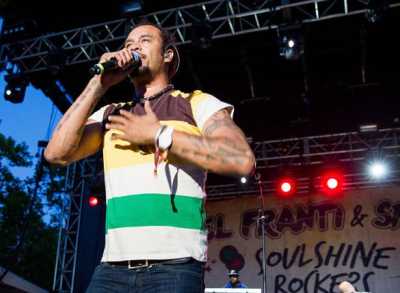|
Taken from Metro (May 27, 2016)
Michael Franti on keeping up with the news cycle, social media and Sean Penn
Michael Franti and Spearhead's 9th studio album is due out June 3.
by Rachel Raczka

Photo by Miikka Skaffari/FilmMagic |
Michael Franti’s ninth studio album titled "Soulrocker" with his ubiquitous band, Spearhead, is due June 3rd. The 50-year-old Oakland, Calif. native, known for his humanitarian and social justice work and their trickle down effect into his songs, calls from San Francisco where he's balancing his work for the Do It for Love foundation and the band's impending summer tour. A creature of ambitious habit — Franti says he drops off around 1 a.m. before waking at 3, and again around 7:30 — the singer-songwriter, known for his peace-positive lyrics, breaks from his two rare hours at home to have a quick chat.
Being the ninth formal release for you, do you still get nervous the week it drops?
Anytime you put your heart into something, you hope people appreciate it. There’s always nervousness — like, “Did I say what I wanted to say?” Then there’s the excitement. I feel really proud of this record in that I’m speaking to issues we face today, and hopefully, that inspires other people to get through their day, too.
When you’re writing about social or political issues, things tend to change so quickly. How do you make sure something you write, then record, then release stays relevant by the time people are listening to it?
Things happen so fast that you have to be mindful not to be too specific and deal more in general terms or it’ll be jaded by the time it comes out. And at the end of the day, you still want to make songs that are a part of a person’s everyday life. It has to have a cool beat and you have to be able to sing along to them. Then again, I look back at songs I’ve written about social issues 20 years ago, and they can still be perfectly suited for what happens today. Unfortunately, things don’t always change.
What period of time do the songs on “Soulrocker” encapsulate for you?
Really just the last year and a half. I feel that when I travel around the world, there are so many people who share [my] compassion and desire for change, but get stuck in that thinking of, “I’m just one person, what can I do?” This album hopefully speaks to that part of us and tells us to say, “I’m one person, and I’m going to do the best that I can to make a contribution.”
You’ve played some of the tracks from this album live way before it got a release date — like you played “Tequila is My Favorite Wine” for audiences last summer. Does this type of live audience feedback affect what ends up on an album?
Totally, and it really effects the way I go about recording it. I write every song with an acoustic guitar, so sometimes when you write a song and there’s a beat around it but until you play it live, you can’t see how the words are coming across or if it needs more energy. You can see that immediately when you play it live.
I was just at the United Nations World Humanitarian Summit and I was talking to Sean Penn who had just screened his movie [“The Last Face”] at Cannes. He had put two years into it and he said, in his words, it was just decimated by the critics. He was really bummed about it, but was like, you know, you can put your heart into something and do what you believe in, but you just have to let it find its audience and get out of the way. For a musician, you have it a little easier because you can write a song in the morning, perform it that night and see how it does. You don’t have to rewrite the script or find actors or get the millions of dollars to do it. I love that aspect of being a musician.
And with social media, you can also get immediate feedback from fans about what they like or what they didn’t. Is that beneficial for you?
I love social media. When I first started in music, we’d get hundreds of snail mail letters and we’d literally type and stuff envelopes to reply. Then it was thousands of e-mails and now it’s social media and you have an ongoing dialogue with hundreds of thousands of people that happens instantaneously. For an artist, it cuts out that middle man who might be editing or filtering and speeds up the communication process.
|